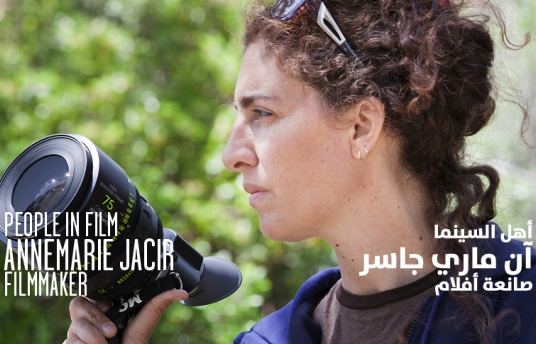People in Film: Annemarie Jacir
Mar 19, 2012

Annemarie Jacir is an acclaimed filmmaker and screenwriter living in Jordan. Two of her films have premiered as official selections at the Cannes Film Festival. Her first feature film, “Salt of this Sea”, was Palestine’s official Oscar entry for Best Foreign Language Film.
Jacir lived in Saudi Arabia until the age of sixteen, and received her formal education in the United States. She began her work in the theatre, writing and directing plays. Her career in cinema began as an editor and camerawoman. She worked in the film industry in Los Angeles before attending Columbia University in New York to obtain a degree in film. She is the co-founder of Philistine Films, an independent production company which focuses on the Arab world. Jacir is also an author and poet. Her poetry and stories have been published in “Mizna”, “The Poetry of Arab Women: A Contemporary Anthology” and the collection “Poets for Palestine”.
She lives in Amman and is currently in postproduction on her new film “When I Saw You”.
DFI: Your first feature “Salt of this Sea” was Palestine’s pick at the Oscars, and the first feature directed by a Palestinian woman. The film tells the story of a Brooklyn woman who travels to the West Bank and Israel to recover her roots. Were you discovering your roots as well?
Jacir: I had a lot of fun researching and writing the character of Soraya, a woman full of passion and flaws. I am not sure I would say she was discovering her roots because for me she has a very solid idea of who she is and where she’s coming from. But rather, her journey was to find a way to deal with the anger she feels inside of her. I think this is something many people can connect with. As for me personally, I grew up knowing my own roots but what I did pass in my life is a stage quite the contrary, in my early 20s, where I ran away from all that and tried to disappear. But that’s not this story.
DFI: How did you finally manage to produce your latest film “When I Saw You”? What were the challenges?
Jacir: “When I Saw You” was entirely financed by film funds and organizations, grants, sponsors, and private investors. It’s a low budget film, one that was shot with less than half its original budget. Shooting a film in Jordan was extremely difficult and in some ways even more difficult than shooting in Palestine. We had just enough money to shoot the film, but once we wrapped, we had to wait a few months to begin editing as we didn’t have support for post-production. Two friends in Amman actually donated a computer to us so we were able to begin the edit.
DFI: What was it like to produce a short film, “Haneen”, with your partner?
Jacir: We are partners in life but also in work and often collaborate. “Haneen” is such a lovely short film. This was my partner Ossama’s first film as a director, so we switched places for a while. And as Ossama is a great producer, it was a challenge for me too. The crew was made up of many close friends and special people who came together to make it happen.
DFI: In 2011, renowned Chinese director Zhang Yimou selected you to be his first protégée as part of the Rolex Arts Initiative. How valuable was it for you?
Jacir: Being selected by Zhang Yimou is one of the most incredible experiences of my life. The man is a genius. He’s also generous and warm and I value so much the time I spent with him.
DFI: Your short film “Like Twenty Impossibles” is the first Palestinian short film to be selected in competition for Cannes. It has won more than 15 awards at festivals around the world. Tell us about the film, and the obstacles you were able to overcome in the making?
Jacir: It’s has been more than ten years since “Like Twenty Impossibles” and the struggles of making independent films remain. Finding support, finding creative ways to work around the restrictions of military occupation. censorship, and distribution. The film was the result of working for years in the film industry. I was learning what kind of cinema I was not interested in making. “Like Twenty Impossibles” was the first short film where I felt I was finding my artistic voice.
DFI: Who inspires you the most in your work?
Jacir: Poetry and my people.
DFI: How do you see the future of Arab cinema at the moment?
Jacir: I think artists will always continue their work, and even more so when they are challenged. Palestinians were born into uprising. It’s all we’ve ever known. I think the situation is different in each Arab country, from Tunisia, to Egypt to Syria. People there are fighting control in their own ways. But one thing is for sure, we will not be silenced and resistance will win.
DFI: What is the project you are currently working on? And when can we expect to see it?
Jacir: My new feature film, “When I Saw You”, is set in 1967. We are hoping to be ready in the summer. I am in Athens now in the middle of post-production. “When I Saw You” won the Thessaloniki International Film Festival awards for post-production, so we were able to complete the film. I am so grateful to the generosity of the Greeks. It is both moving and even funny that this totally broke country has reached out to help a struggling film like ours.